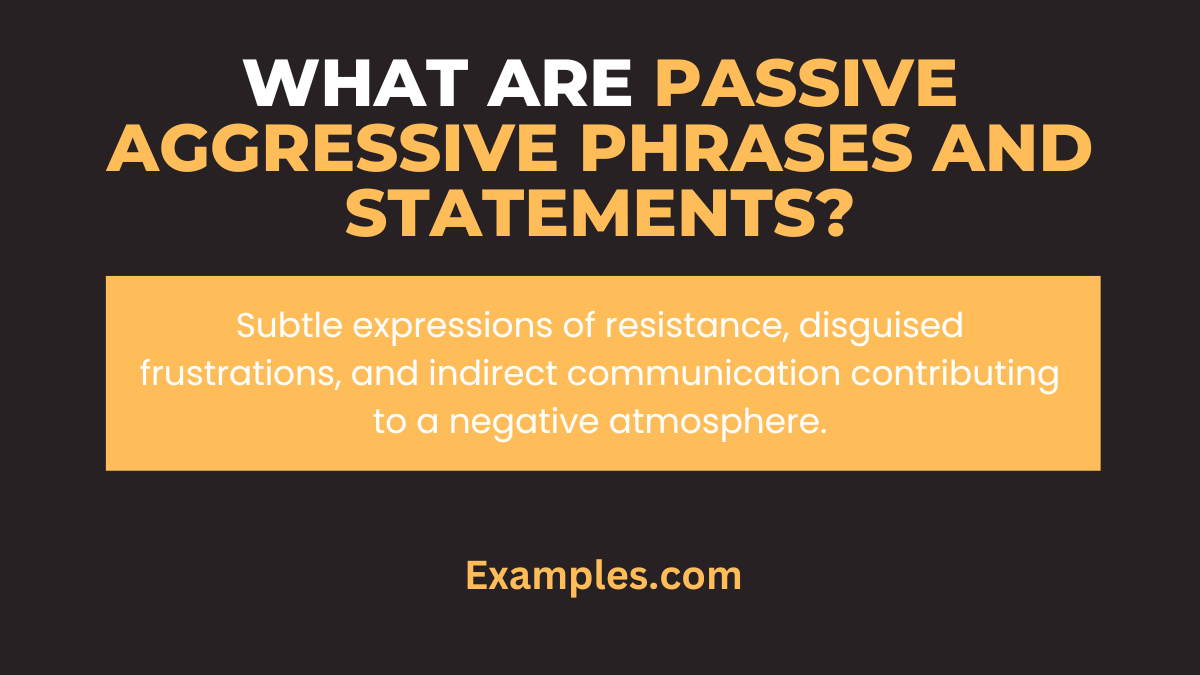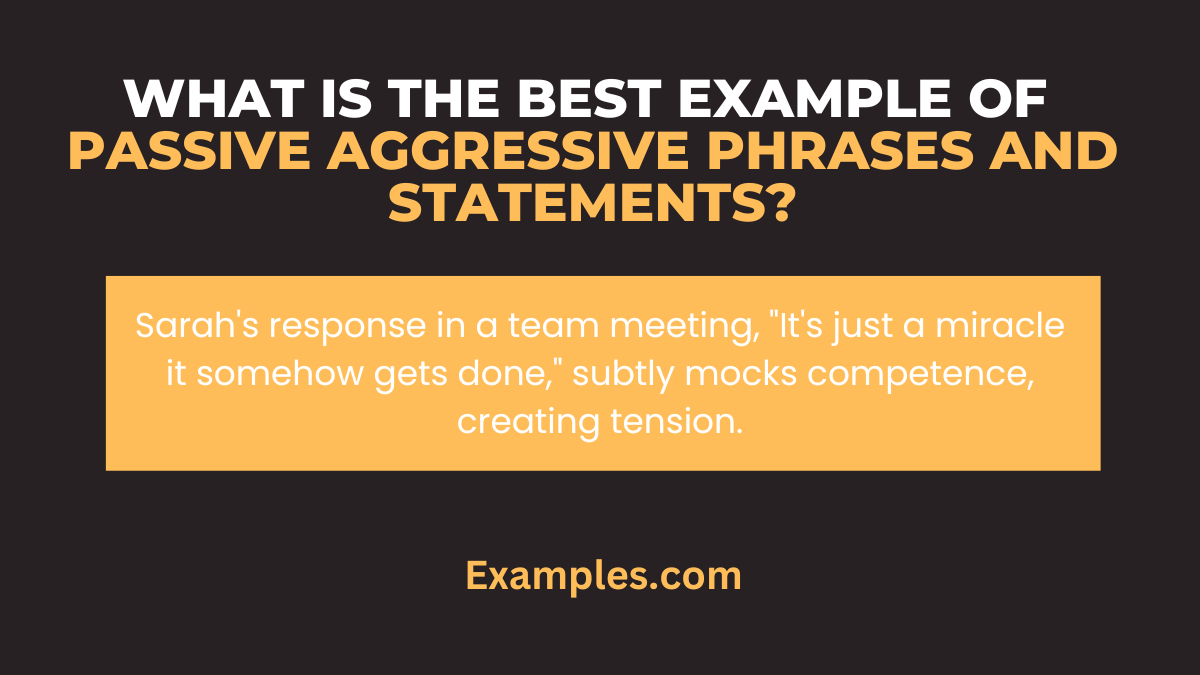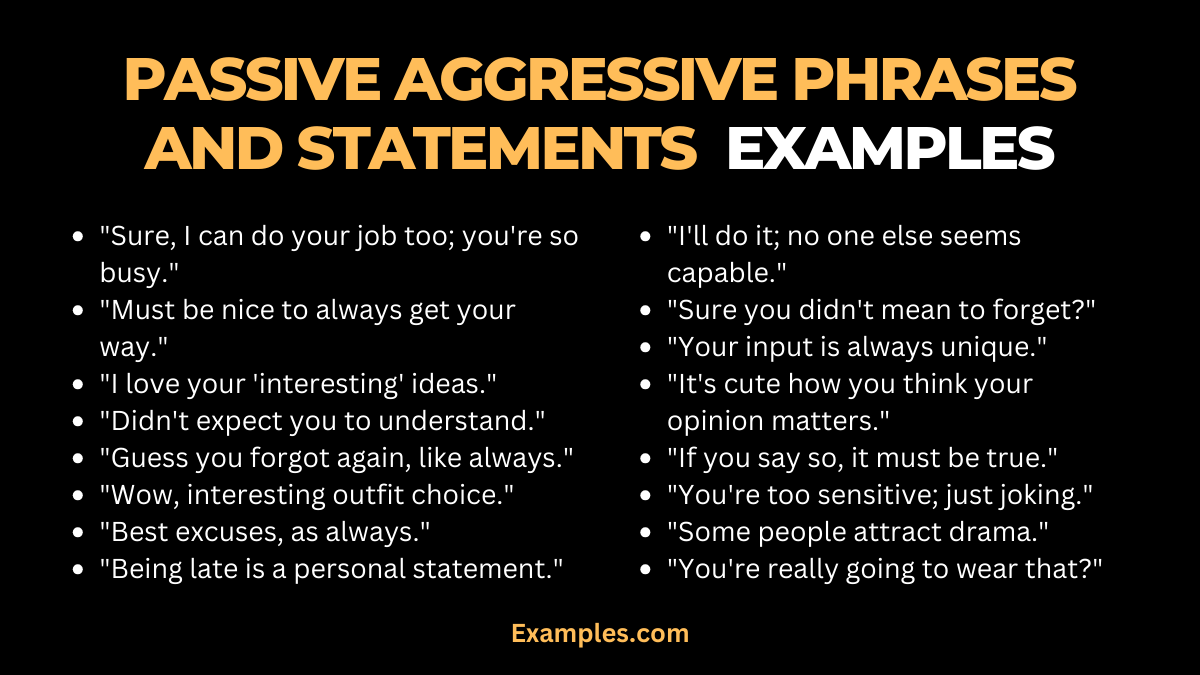19+ Passive Aggressive Phrases and Statements Examples
Unlock the nuances of interpersonal dynamics with our comprehensive guide on Passive Aggressive Phrases and Statements. Navigate through real-life scenarios and expert insights to enhance your communication skills. Delve into insightful Communication Examples to recognize, address, and transcend passive-aggressive encounters, fostering healthier connections in both personal and professional spheres. Unleash the power of effective communication and decode the intricacies of subtle expressions for a more harmonious dialogue.
What are Passive Aggressive Phrases and Statements?

Passive-aggressive phrases and statements refer to indirect, often covert, communication that conceals hostility or resistance. This behavior involves veiled negativity, creating challenges in understanding and addressing the underlying issues. Discover the distinctive characteristics and implications of passive-aggressive expressions in our comprehensive guide. Enhance your awareness and communication skills to navigate the complexities of interactions with clarity and authenticity.
What is the best Example of Passive Aggressive Phrases and Statements?

In a team meeting, when asked about project progress, Sarah responds with a sweet smile, “Oh, it’s just a miracle every time it somehow gets done, isn’t it?” Her seemingly innocent tone masks a subtle mockery, implying incompetence within the team. This passive-aggressive remark creates tension, undermines collaboration, and exemplifies the detrimental impact of covert expressions in professional settings. Understanding and addressing such examples are crucial for fostering a healthy work environment.
20 Example of Passive Aggressive Phrases and Statements

Passive-aggressive phrases and statements involve indirect expressions of hostility or resentment. These elusive forms of communication can harm relationships and foster a toxic environment. Understanding these examples is vital for recognizing and addressing passive-aggressive behavior in various contexts.
- “Sure, I can do your job too since you’re so busy.”
- Explanation: Concealing resentment, this statement mocks a colleague’s workload, hinting at perceived incompetence.
- “Must be nice to always get your way.”
- Explanation: Veiled sarcasm insinuates jealousy or frustration about someone consistently achieving their desires.
- “I love how you always have such interesting ideas.”
- Explanation: A seemingly positive comment conceals sarcasm, suggesting a lack of genuine appreciation.
- “Oh, I didn’t expect you to understand.”
- Explanation: Implying intellectual superiority, this phrase belittles others while maintaining a facade of innocence.
- “Guess you forgot again, like always.”
- Explanation: Undermining through insinuation, this phrase criticizes forgetfulness with a passive-aggressive edge.
- “Wow, that’s an interesting choice of outfit.”
- Explanation: A seemingly innocent comment masks disapproval, subtly criticizing someone’s fashion taste.
- “I wish I could be as carefree and unprepared as you.”
- Explanation: Conveying sarcasm, this phrase implies a lack of responsibility while pretending to express admiration.
- “You always have the best excuses, don’t you?”
- Explanation: Accusatory in nature, this statement implies skepticism and frustration regarding someone’s reliability.
- “I didn’t realize being late was a personal statement.”
- Explanation: A thinly veiled critique, suggesting that tardiness is a deliberate act for attention or defiance.
- “You’re so lucky to be naturally talented; some of us have to work hard.”
- Explanation: Undermining achievements, this remark insinuates that success comes effortlessly to the target.
- “I’ll do it since no one else seems capable.”
- Explanation: Asserting superiority, this phrase belittles others’ abilities while positioning the speaker as the only competent one.
- “I’m sure you didn’t mean to forget; it happens when you’re not paying attention.”
- Explanation: Criticizing forgetfulness, this statement implies negligence or lack of focus.
- “I thought we agreed on something, but I guess I was wrong.”
- Explanation: Indirectly blaming others for miscommunication, this phrase shifts responsibility subtly.
- “Your input is always so unique; I never would have thought of that.”
- Explanation: A backhanded compliment, suggesting that the person’s contributions are unconventional or odd.
- “It’s cute how you think your opinion matters.”
- Explanation: Undermining someone’s viewpoint, this phrase dismisses their thoughts with a patronizing tone.
- “If you say so, I’m sure it must be true.”
- Explanation: Conveying skepticism, this statement doubts the credibility of the speaker’s assertion.
- “You’re too sensitive; I was just joking.”
- Explanation: Dismissing responsibility, this phrase minimizes the impact of potentially hurtful comments as mere humor.
- “I didn’t expect much, so I wasn’t disappointed.”
- Explanation: Lowering expectations, this phrase subtly criticizes someone’s abilities or performance.
- “I guess some people just attract drama wherever they go.”
- Explanation: Blaming others for drama, this statement implies that the person is the cause of their own troubles.
- “You’re really going to wear that?”
- Explanation: Criticizing fashion choices, this question implies disapproval and suggests a lack of style awareness.
Passive Aggressive Phrases and Statements Examples at Work
Navigating workplace dynamics involves recognizing passive-aggressive language. Here are examples:
- “Sure, we can go with your plan; it’s not like mine took any effort.”
- Explanation: Undermines a colleague’s input while pretending to agree.
- “You’re really taking another day off? Must be nice to have such a relaxed schedule.”
- Explanation: Disguises jealousy or frustration as a casual comment on someone’s time off.
- “I wasn’t aware we had part-time hours for full-time positions.”
- Explanation: Implies criticism for perceived lack of effort or productivity.
- “Oh, you’ve been promoted again? I guess the bar is set pretty low around here.”
- Explanation: Downplays a colleague’s achievement while expressing faux surprise.
- “I love how you volunteer for extra work; some of us prefer a better work-life balance.”
- Explanation: Criticizes dedication, insinuating that choosing additional tasks is a negative trait.
Passive Aggressive Phrases and Statements Examples in Relationship
Identifying passive-aggressive communication in relationships is crucial. Here are examples:
- “You always forget to do the dishes; I guess it’s my job to clean up after you.”
- Explanation: Blames and criticizes without direct confrontation.
- “I’m sure you have more important things to do than spend time with me.”
- Explanation: Expresses loneliness or hurt while guilting the partner for perceived neglect.
- “I didn’t expect you to remember our anniversary; it’s just another day, after all.”
- Explanation: Downplays the importance of an event while expecting acknowledgment.
- “You’re going out with your friends again? Don’t worry about me; I’ll find something to do.”
- Explanation: Guilt-trips the partner for pursuing personal time while feigning indifference.
- “I must be the only one who cares about our relationship; you seem to have other priorities.”
- Explanation: Accuses the partner of neglecting the relationship while framing it as selfless concern.
What are the Word Phrase to Stop Passive Aggressive Behavior?
Dealing with passive-aggressive behavior necessitates employing specific phrases to diffuse tension and promote positive interaction.
- “I” Statements: Initiate conversations with “I” statements to express feelings without blame. For example, say, “I feel concerned when expectations are unclear.”
- “Let’s Clarify”: Encourage transparency by proposing clarification. Use phrases like “Let’s clarify our expectations to avoid misunderstandings.”
- “Direct Communication”: Promote open dialogue. Address issues directly by saying, “Let’s communicate openly to resolve any concerns.”
- “Setting Boundaries”: Establish personal limits politely. Communicate availability, such as “I’m available for work discussions during office hours.”
- “Optimistic Redirect”: When faced with negativity, redirect the conversation positively. Phrase it like, “Let’s focus on solutions rather than dwelling on problems.”
What are Passive Aggressive Phrases and Statements Strategies?
- Identify Triggers: Recognize situations that provoke passive-aggressive tendencies.
- Practice Direct Communication: Express concerns openly and assertively.
- Encourage Honest Feedback: Create an environment where open communication is welcomed.
- Set Clear Expectations: Establish transparent expectations to avoid misunderstandings.
- Use “I” Statements: Share feelings without accusing, focusing on personal experiences.
- Seek Professional Support: When needed, involve a mediator or counselor for conflict resolution.
In conclusion, mastering communication to counter passive-aggressive behavior is pivotal for fostering a positive environment. Utilizing constructive phrases, setting clear boundaries, and promoting empathy can transform interactions. By recognizing harmful language and encouraging direct, open dialogue, individuals can navigate relationships with resilience and cultivate a healthier, more harmonious atmosphere.



